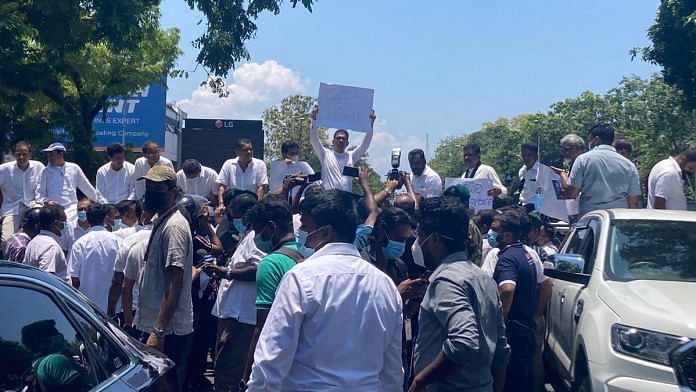A state of emergency has been declared in Sri Lanka. Social media has been banned on top of the curfew imposed in the island. People have been protesting in thousands on the streets. There is shortage of food and fuel and a severe economic crisis. Even education has been hampered as exams have been delayed and newspapers and magazines are being printed less.
In February this year, Sri Lanka’s foreign currency reserves were only 2.3 billion dollars, a drop of 70 per cent from January 2020 figures. With decline in foreign reserves, it became a struggle to import goods and services from other countries. Unlike other countries that import luxury goods, Sri Lanka imports basic items like sugar, cereals, pharmaceuticals, etc. Since the country is in a debt of 4 billion dollars, the items available in the country are being sold at a higher price than usual.
A glimpse of the crisis
Sri Lanka has witnessed 25 per cent inflation over the past one month. A Sri Lankan activist told The Indian Express that the current prices of 1 kg rice is Rs 290, sugar is being sold at Rs 290/kg and milk powder costs Rs 750 for 400 grams. For reference, Re1 equals 3.94 Sri Lankan Rupee. In another article of the paper a school teacher informed that in their family of three, the monthly expense used to be around 30,000 LKR, which has now increased to 83,000 LKR. This was regarding the food crisis.
On top of this, people are facing power/fuel crisis. Electricity is available for only four hours a day on average. The situation is so bad that ministers have ordered switching off street lights to save electricity. Lanka IOC (Indian Oil Corporation) has sent 6,000 MT of diesel to ease this issue to some extent. Cooking gas is being delivered only once a week now and the price has increased from 3,000 to 4,200 Sri Lankan Rupee which is around Rs 1,200 in Indian currency. There are large queues outside fuel stations.
People are migrating from Sri Lanka to India in the face of the economic crisis. Indian Coast Guard rescued a total of six refugees who were dropped off near an island of Rameshwaram, Tamil Nadu, and later handed over to the police who took them to a refugee camp. Another group of 10 migrated to India paying high costs of Rs 3 lakh just to get out of the situation in their home country. Intelligence officers of Tamil Nadu have estimated that over 2,000 more refugees will arrive soon. Tamil Nadu Chief Minister M.K. Stalin met with Prime Minister Narendra Modi seeking permission for humanitarian aid by the state government for these refugees.
Also read: Drink, gamble, plan the exit: How Sri Lankan elites in Colombo are handling economic crisis
Reasons for the economic crisis
Sri Lanka was one of the top tourist destinations in the world in 2018. About 12-13 per cent of its GDP came from the tourism industry. In April 2019, there were multiple bombings in different parts of the country that killed at least 290 people and injured 45 foreign nationals. This heavily impacted tourism.
The very next month saw anti-Muslim violence wherein houses, shops and vehicles were vandalised and led to religious tensions. In March 2020, the Covid pandemic further affected the tourism sector. There was no economic growth as well; paying of taxes halted as people were not even getting out of their houses due to lockdown. President Gotabaya Rajapaksa’s policy of converting the country’s agriculture to organic farming led to decrease in both imports and exports of food materials.
Ministers have now resigned due to the growing economic crisis. However, the President and Prime Minister are yet to follow suit.
The author is a student at Kamala Nehru College, University of Delhi. Views are personal



